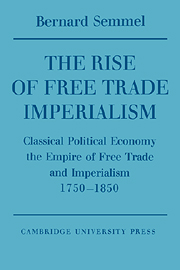 The Rise of Free Trade Imperialism
The Rise of Free Trade Imperialism Book contents
- Frontmatter
- Contents
- Preface
- 1 Introduction
- 2 Theory and politics of Free Trade Empire in the eighteenth century
- 3 The agrarian critique and the emergence of orthodoxy
- 4 The third school: Wakefield and the Radical economists
- 5 The Wakefield program for middle-class empire
- 6 Parliament, political economy, and the Workshop of the World
- 7 Cobdenism and the ‘dismal science’
- 8 Mercantilist revival
- 9 Classical political economy, the Empire of Free Trade, and imperialism
- Selected Bibliography
- Index
4 - The third school: Wakefield and the Radical economists
Published online by Cambridge University Press: 23 October 2009
- Frontmatter
- Contents
- Preface
- 1 Introduction
- 2 Theory and politics of Free Trade Empire in the eighteenth century
- 3 The agrarian critique and the emergence of orthodoxy
- 4 The third school: Wakefield and the Radical economists
- 5 The Wakefield program for middle-class empire
- 6 Parliament, political economy, and the Workshop of the World
- 7 Cobdenism and the ‘dismal science’
- 8 Mercantilist revival
- 9 Classical political economy, the Empire of Free Trade, and imperialism
- Selected Bibliography
- Index
Summary
The chief theorist of empire-building during the first half of the nineteenth century was the projector of ‘systematic colonization’, Edward Gibbon Wakefield, a political economist of uncommon abilities. During the thirties and forties, he became the virtual ‘head’, and his writings the center of focus for the ‘third school’ of political economy, the school of Malthus and Smith, of which the former had written. Availing himself of both Malthus' and Ricardo's analyses, he constructed a picture of an industrial society which, though beset by flaws, might be made viable by a program of empire-building. He embraced the goal of making England the Workshop of the World, as it had been sketched by Torrens and Ricardo, and saw its realization, in association with a program of systematic colonization, as the means of overcoming the internal contradictions of a commercial and industrial system, as described by Malthus—most particularly, stultifying glut, of goods, of capital, and of men. Since Wakefield was ‘sound’ on trade questions, that is opposed to the corn laws, and since his theory of systematic colonization had been erected upon impeccably Ricardian foundations, and his personal connections with middle-class Radicalism were substantial, his ‘heresies’ stirred less opposition. His writings and a forceful and engaging personality, in fact, secured for his leading ideas a remarkable degree of acceptance. Indeed, he appears, as we shall see, to have won over such stalwarts of the Ricardian school as Bentham and both the Mills, to many of his views, although there were glimmerings of heterodoxy in the writings of these Radicals even before Wakefield had made his appearance.
- Type
- Chapter
- Information
- The Rise of Free Trade ImperialismClassical Political Economy the Empire of Free Trade and Imperialism 1750–1850, pp. 76 - 99Publisher: Cambridge University PressPrint publication year: 1970
- 1
- Cited by


